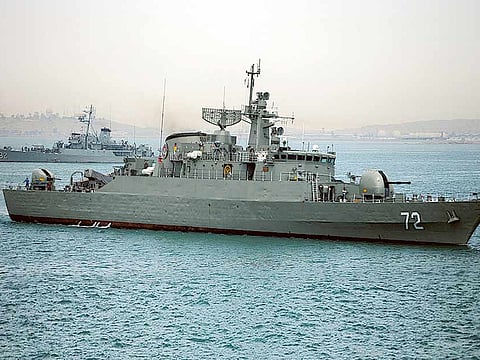Iran’s two faces of foreign policy — a historical outcome or a political approach?
Iran chooses the path of compromise with the West and one of confrontation with neighbours

Dubai: When Iranians protested against the country’s 2009 presidential election results and the victory of incumbent Mahmoud Ahmadinejad against his moderate rivals Mir-Hussain Mosavi and Mahdi Karroubi, they were brutally crushed by the authorities. But when Egyptians revolted against the former president Hosni Mubarak, Tehran defended the people’s freedom to choose.
When Al Houthis in Yemen revolted against the elected leadership and took over the country earlier this year, Tehran welcomed the move. And when Saudi-led alliance started a military operation to support the elected Yemeni government against Al Houthis, it criticised the alliance attacks and called for dialogue.
When the western powers expressed concerns of Iran’s nuclear programme, Iran showed a different peaceful attitude, stressing its peaceful plans, and showing willingness to engage and make concessions.
Iran, analysts say, is following a two-faced policy depending on the party it is dealing with.
“When you look at the international level, there is a very strong willingness on Iran side to engage,” said Sabahat Khan, senior analyst at the Dubai-based Institute for Near East and Gulf Military Analysis.
As an example, during Iran’s talks with the western powers over its nuclear programme, Tehran showed readiness “to continue negotiations even when there are obstacles. They demonstrated serious commitment to resolving issues in a political manner with dialogue and give and take.”
However, “when you look at the region, it is a different [approach]. They prefer to play with hard power,” Khan told Gulf News.
Others analysts expressed a similar view. “[Iran is a] very complicated country and Iranian officials actions and words are rooted not only in the Islamic revolution and related thinking, but also on a Persian identity,” said Dubai-based Theodore Karasik, a geopolitical analyst.
Also, political scientist at Qatar University Mahjoub Zweiri, author and co-author of several books on Iran, said the two-faced Iranian policy comes “because the Islamic revolution system doesn’t see a rival to it in the region, and it looks at Arabs with a [sense of] superiority”.
“Everything within this superiority context explains Iranian’s political and diplomatic approaches,” Zweiri explained in an interview with Gulf News. This explains Iran’s “shock” at the Saudi-led Arab alliance attacking its allies, the Al Houthis, in Yemen, he added. Launching a war on Al Houthis has “actually messed up Iran’s agenda for the [Arab] region,” Zweiri said.
But when it comes to the West, he noted, Iran follows a different approach “because Europe [West] has a powerful public relations mechanism that is capable of changing Iran’s image abroad and showing it as a good and democratic country.”
Throughout the attacks on Al Houthis in Yemen, Iran kept up its criticism of the Saudi move and demanded an end to the operation and continued its call for talks.
Hussain Amir-Abdollahian, Iran’s deputy foreign minister for Arab and African affairs, said on Saturday that Saudi Arabia’s focus on its war against Yemen only benefits the Israeli regime and terrorist groups.
He reaffirmed Iran’s call for a diplomatic solution to the Yemeni crisis, saying, “Tehran supports Yemeni-Yemeni dialog [to be held] in a venue agreed upon by all Yemeni groups, and rejects any foreign interference in this country.”
For many years, Arab countries have accused Iran of interfering in their internal affairs and attempting to destabilise the Arab region.
Iran had denied the accusations earlier. However, some officials in Tehran recently spoke openly of their country’s wish of spreading its influence in the Arab region.
Analysts based in Iran told Gulf News that Tehran’s moves, including those in Yemen, are governed by its interests and in protecting these interests.
“Tehran’s comments about ‘Iranian security interests in Yemen’ redefine geography through the rhetoric of hegemony. When will we hear discourse that reinforces sovereignty, stability and non-intervention?” Anwar Gargash, UAE Minister of Foreign Affairs, wrote in a tweet.
After reaching an agreement between Iran and the western powers over the nuclear programme nearly a month ago, US President Barack Obama invited leaders of the six Arab Gulf states for talks in Washington on the deal.
On the table, will be “discussions on how to box in Iran, so it can be a neutral player in the region as opposed to making troubles,” said Karasik.
From an Arab perspective, “Iran’s involvement needs to be scaled back”, he noted, and that idea of reducing (Iranian) presence (in the Arab region) is part now of getting the Arab support to the nuclear agreement, as the “two issues that have become mixed together politically”
Asked whether the West will be receptive to the Arab demands, Karasik replied “I don’t think they will.”
Yet, not all of them will have the same response, he noted.
“I think that you are going to see a split between some of the western states over this key issue.”
Sign up for the Daily Briefing
Get the latest news and updates straight to your inbox

